The rescue
by John Spurling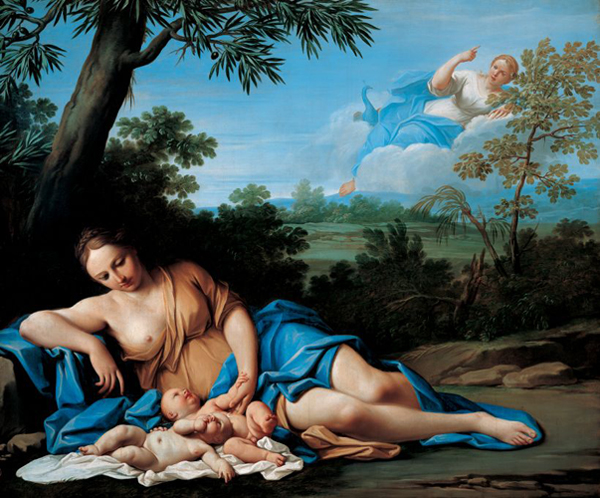 The Birth of Apollo and Diana by Marcantonio Franceschini, 1692–1709. Liechtenstein Museum/Wikimedia Commons” width=”300″ height=”249″>Two hours’ walk from our house, on the highest point of the ridge overlooking the Myrtoan Sea, is the sanctuary of Apollo the Shepherd. Nothing is left of its buildings except an outline of stone in the open ground behind the chapel of the Prophet Elijah, which occupies the centre of this more or less circular space, walled, and surrounded with mountain oaks. But along the north and south sides of the chapel, large blocks of marble, which were no doubt once part of Apollo’s temple, provide seating for weary pilgrims. The walk is mostly uphill, with dips down to two dried-up riverbeds, by way of ancient donkey tracks made of green and black boulders, and a modern dirt road which twists round the hill past olive groves, a vineyard, a communications’ mast with a throbbing engine and, nearer the top, oak trees. Apollo’s special trees are the laurel, the poplar and the palm, but as the son, vice regent and appointed prophet of Zeus, conveying his father’s commands and warnings to mortals through the oracles of Delphi and Delos, his presence here evidently rates a halo of the oaks usually associated with Zeus.
The Birth of Apollo and Diana by Marcantonio Franceschini, 1692–1709. Liechtenstein Museum/Wikimedia Commons” width=”300″ height=”249″>Two hours’ walk from our house, on the highest point of the ridge overlooking the Myrtoan Sea, is the sanctuary of Apollo the Shepherd. Nothing is left of its buildings except an outline of stone in the open ground behind the chapel of the Prophet Elijah, which occupies the centre of this more or less circular space, walled, and surrounded with mountain oaks. But along the north and south sides of the chapel, large blocks of marble, which were no doubt once part of Apollo’s temple, provide seating for weary pilgrims. The walk is mostly uphill, with dips down to two dried-up riverbeds, by way of ancient donkey tracks made of green and black boulders, and a modern dirt road which twists round the hill past olive groves, a vineyard, a communications’ mast with a throbbing engine and, nearer the top, oak trees. Apollo’s special trees are the laurel, the poplar and the palm, but as the son, vice regent and appointed prophet of Zeus, conveying his father’s commands and warnings to mortals through the oracles of Delphi and Delos, his presence here evidently rates a halo of the oaks usually associated with Zeus.
Some English guests who walked to the sanctuary with me were amused by the presumption of the Christians in replacing the Greek prophet with the Jewish one. Apollo and Elijah share another aspect too, their connection with the sun. Elijah, whose name in Greek is Elias, was carried up to Heaven in a fiery chariot. The ancient Greek for sun is Helios, Elios in modern Greek. The ancient Greeks imagined it as a chariot racing across the sky, and Apollo, among his many other functions, is the god of the sun. So is Apollo’s counterpart among the ancient Persians, Mithras, many of whose aspects were adopted centuries later for Christ. Mithras was the mediator between mankind and the Supreme Being, called the Eternal; Sunday or Sun-day, the seventh and last day of the week (seven being his sacred number) was known as ‘the Lord’s day’; his birthday was celebrated on 25 December and his rebirth at Easter; the secret rituals of his cult included baptism and a sacred meal; he would preside over the Last Judgment and welcome his faithful followers into Heaven as a father to his children. What magpies those Christians were! Or is it just that new religions are like company takeovers and promote the same goods or gods under new names?
Perhaps the similarity of Hera’s name to Herod’s gave the Christian storytellers the idea, after the birth of Christ, of sending their holy family on the same sort of flight from persecution.”
Apollo himself was not born in a stable, but, together with his twin sister Artemis, even more humbly, in the open, sheltered only by a palm tree. Their mother Leto, a Titan’s daughter pregnant by Zeus and pursued all over Greece by the jealous anger of Zeus’ wife Hera, finally found refuge on the small uninhabited island of Delos. Perhaps the similarity of Hera’s name to Herod’s gave the Christian storytellers the idea, after the birth of Christ, of sending their holy family on the same sort of flight from persecution. But even when Leto’s flight ended and her birth pangs began, when the Olympian gods, like Christ’s herald angels, had flown in to welcome the new immortals, Hera deliberately delayed the arrival of the birth goddess Eileithyia and kept Leto in agony for nine days and nights. However, when the twins finally emerged, the whole island became a carpet of flowers, just as the hillsides all around our house do every spring.
 Apollo and Diana by Lucas Cranch the Elder, c. 1526. Royal Collection/Google Art Project/Wikimedia Commons” width=”200″ height=”300″>Greek gods grow up as rapidly as spring flowers. Within a few days of his birth, Apollo went to Mount Parnassos, the lair of the monstrous serpent Python – Hera’s accomplice in the pursuit of Leto – and wounded him with an arrow. Python crept into the sanctuary of Gaia (Mother Earth) at Delphi, but Apollo followed him in and finished him off. So, from the very beginning Apollo had a record of conflict with the older gods. The original shepherd god of Arcadia was the disreputable, lecherous Pan, but Apollo usurped most of his functions, including his habit of pouncing on pretty nymphs. One might imagine that the youthful, athletic, clean-shaven, radiantly handsome Apollo would have been more appealing to the nymphs than the old, ugly, goat-legged, horned and hairy Pan, but women’s tastes are often surprising – at least to men – and there are several instances of nymphs running away from Apollo, notably Daphne. As he closed with her, she was turned by Gaia, still at odds with Apollo, into a laurel, which became Apollo’s favourite tree.
Apollo and Diana by Lucas Cranch the Elder, c. 1526. Royal Collection/Google Art Project/Wikimedia Commons” width=”200″ height=”300″>Greek gods grow up as rapidly as spring flowers. Within a few days of his birth, Apollo went to Mount Parnassos, the lair of the monstrous serpent Python – Hera’s accomplice in the pursuit of Leto – and wounded him with an arrow. Python crept into the sanctuary of Gaia (Mother Earth) at Delphi, but Apollo followed him in and finished him off. So, from the very beginning Apollo had a record of conflict with the older gods. The original shepherd god of Arcadia was the disreputable, lecherous Pan, but Apollo usurped most of his functions, including his habit of pouncing on pretty nymphs. One might imagine that the youthful, athletic, clean-shaven, radiantly handsome Apollo would have been more appealing to the nymphs than the old, ugly, goat-legged, horned and hairy Pan, but women’s tastes are often surprising – at least to men – and there are several instances of nymphs running away from Apollo, notably Daphne. As he closed with her, she was turned by Gaia, still at odds with Apollo, into a laurel, which became Apollo’s favourite tree.
Still, there were a great many nymphs as well as mortal women who did not run away from Apollo, or not fast enough, and he had many children, some by members of his particular group of followers, the nine Muses. For Apollo was not only the god of the sun and of shepherds, but also of music and the other arts, as well as of disease and healing, which he delegated to his son Asclepios. Asclepios’ own sanctuary-cum-hospital has been excavated at Epidauros, now most famous for its theatre, and he was such a successful healer that Zeus was afraid humans would cease to die. He loosed a thunderbolt at his medical grandson and struck him dead. But this made Apollo so angry that, not being able to punish his father, he killed instead the one-eyed giants, the Cyclops, who had manufactured Zeus’ thunderbolts. And this in turn made Zeus so angry that he punished Apollo by giving him a year’s hard labour as shepherd and general dogsbody to a Thessalian king called Admetos.
Fortunately Apollo liked his master, well known as a generous and hospitable person, who gave liberal dinner-parties to his guests and laid on festivals and public entertainments for his subjects. In any case, Admetos must have been careful not to offend his divine servant by asking too much of him in the way of hands-on tasks such as lambing, shearing or removing parasites. But at the end of the year Admetos, who was barely middle-aged, was suddenly struck down with a fatal disease and there was now, of course, no Asclepios to cure him, nor it seems could Apollo himself save a man whose death had already been scheduled by fate. The best he could do was to have a word with Death, who relented only so far as to demand a substitute. If Admetos could find anyone willing to die instead of him, he could at least live until he was a bit older. Admetos, lying on his sickbed, called in his friends and subjects, but there were no takers.
“You’re a good man, Admetos, a kind host and a popular monarch and we shall all miss you dreadfully, but really it’s too much to ask. I have my own life to live – only the one, after all, and I can’t just throw it up, not even for you.”
That was the general response in the kingdom of Pherai. Finally Admetos turned to his parents, the former king Pheres and his queen. Tired of ruling, they had retired to their pleasant house by the sea and passed the throne to their son. Surely one or other of them would be only too happy to lay down the burden of old age, the painful joints and muscles, the rotting teeth, the grumbling insides, dimming sight and fading memories, and allow their son his proper time in the sun? But no, they were not at all happy to do so, they wouldn’t hear of it – or actually, it seemed, couldn’t hear it.
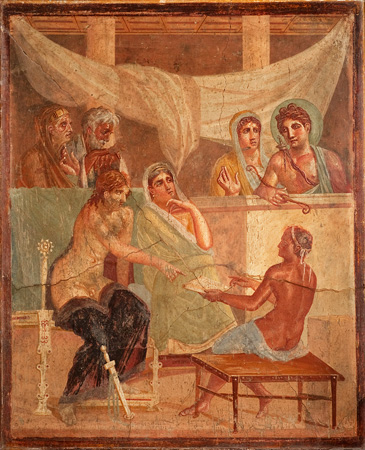 “What’s that you say? Your voice is very faint now, poor dear Admetos, and our hearing is not what it was. Death, you say, will take someone else? Of course he will. He will take us all in time. Yes, as you say, our time is pitifully short now, but don’t worry about us, we will make the best of what we have left. No, we are not unhappy, except to lose you. But what can we do? It seems quite unfair that Death has come for you before he comes for us, but don’t be too sad for us, losing our dear son, we shall survive for a while, we shall try to be happy for as long as death spares us, we shall sit in the sun and think of you…”
“What’s that you say? Your voice is very faint now, poor dear Admetos, and our hearing is not what it was. Death, you say, will take someone else? Of course he will. He will take us all in time. Yes, as you say, our time is pitifully short now, but don’t worry about us, we will make the best of what we have left. No, we are not unhappy, except to lose you. But what can we do? It seems quite unfair that Death has come for you before he comes for us, but don’t be too sad for us, losing our dear son, we shall survive for a while, we shall try to be happy for as long as death spares us, we shall sit in the sun and think of you…”
“Among the gibbering shades! You refuse to take my place, then?”
“We gave you our place, didn’t we, our place on the throne? No, we can’t take it back. But your son will soon be old enough and your wife is a fine woman who will hold things together in the meanwhile.”
“But you could die instead of me. Apollo himself has arranged that.”
“Yes, we know how friendly you are with Apollo and it’s rather surprising he can’t arrange for you not to die. Gods are so powerful and he’s more powerful than most.”
No, the old sods were going to cling on to their miserable existence, sitting in the sun, eating and drinking, mumbling to each other about their various symptoms, sleeping most of the day and all night, served hand-and-foot and carried to and fro by their slaves, to the bitter end. But when Admetos told his pretty young wife Alcestis about the negative response of all his friends and subjects and above all the meanness and selfishness of his parents, she replied immediately:
“There’s one person you haven’t asked. I’ll do it. I’ll die instead of you.”
“You? No, no, I couldn’t have that, I couldn’t bear that.”
But in the end he could and did. Apollo informed Death and Death agreed to take Alcestis instead of Admetos. Admetos began to recover and Alcestis to sicken. He got out of his bed and she got into hers. And now Admetos began to realise what he’d done. He’d escaped death only to ruin the life he’d recovered. How could he go on living without the one person who loved him so much that she was ready to die for him? How could he hold up his head in public when everyone knew that he’d taken his wife’s life in exchange for his own? What could he say to his children when they asked him why their mother had had to die so young?
“It was her or me, you see, and we chose her.”
Such are the gifts of the gods. Miracles, interferences with the laws of nature, are never free lunches. The gods, of course, are well aware of this, so they seldom perform miracles for short-sighted mortals, and even when they merely offer advice in the form of prophecies they know that misunderstandings and probably wrong actions will follow. Unlike the older gods, who care nothing for humans except to punish them for their crimes, the Olympians often feel pity for them, especially for the shortness and misplaced ambitions of their lives. But what can they do when these inadequate creatures have false ideas, barely controlled emotions, bad heredity, aggressive instincts, short lives and to some degree free will? It takes a hero of the calibre and strength of Herakles, another son of Zeus, but by a mortal woman, to force events to a more satisfactory conclusion.
The Olympians prefer not to witness the decay and death of mortals, though they don’t flinch from seeing or even causing sudden death. There were gods helping the principal warriors on both sides in the Trojan War.”
Herakles happened to be passing through Pherai, on his way north to steal some man-eating mares which belonged to a barbarous king in Thrace, on the very day Alcestis was expected to die. Herakles feared neither god nor man nor monster. He’d already had a fight with Apollo, when, after a bout of the madness which sometimes seized him, Herakles had visited Delphi to get advice and the priestess refused to answer his questions. He’d tipped her off the sacred tripod and was dragging it out of the temple and about to throw it over the cliff when Apollo stopped him and the two came to blows. The fight was broken up by their mutual father, Zeus, who threw a flash of lightning between them. But on this occasion, Apollo, having settled the substitution of Alcestis for Admetos, had already left Pherai when Herakles arrived. The Olympians, whether out of tact or disgust, prefer not to witness the decay and death of mortals, though they don’t flinch from seeing or even causing sudden death. There were gods helping the principal warriors on both sides in the Trojan War and even sometimes taking part in the battle themselves, though usually wearing the appearance of one of the mortal warriors.
Herakles was welcomed by the distraught Admetos and given rooms in a distant part of the palace, well away from the dying Alcestis. Admetos, hospitable as ever in spite of his misery, knew that if he told Herakles about Alcestis, his distinguished guest would insist on staying the night somewhere else. Nevertheless, sitting at his wife’s bedside, taking leave of her forever, Admetos could not entertain Herakles properly and personally and, having told the servants to provide him with food and drink, forgot all about him. Herakles, considering his rudely neglectful host to be a man of false pretences whose hospitality had been ludicrously overpraised, drank himself into a destructive rage, singing lewd songs, smashing the furniture, throwing the food and the cups and dishes at the ceiling or through the window, pissing against the walls, terrifying the servants, and finally to their great relief passing out in a huge heap of mighty limbs and bulging muscles on the floor.
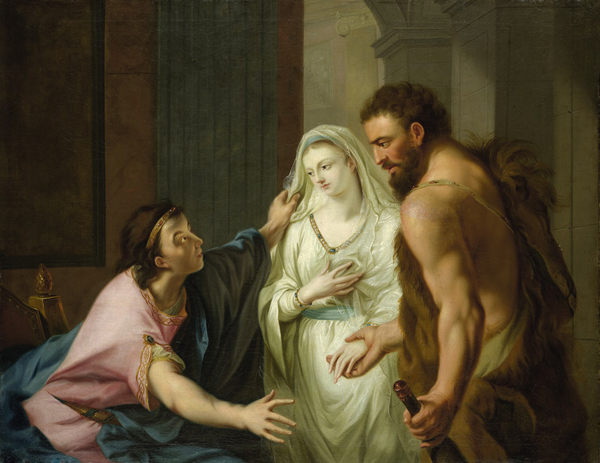 c. 1780/Wikimedia Commons” width=”300″ height=”231″>Alcestis died early in the morning and Admetos gave orders for her body to be carried to the family tomb – a large domed chamber in the side of a hill beyond the city-walls – and for the funeral to be held the next day. Then he retired to his private room to grieve alone and no one dared disturb him with news of his guest’s behaviour the night before. Herakles himself came to his senses towards evening and seeing what he had done was deeply ashamed. He went into the courtyard, fetched water up from the well and drenched himself, while the servants observed him covertly from various windows and doorways without daring to go near him. Wondering where everybody was, he sat down on the wall round the well and began to pick a thorn out of the sole of one of his feet. And now three or four serving-women who had escorted the body of Alcestis to the tomb and only just returned from sitting there all day in sad attendance, entered the courtyard on their way back into the palace. They stopped in amazement at the sight of this huge naked man sitting on the side of the well.
c. 1780/Wikimedia Commons” width=”300″ height=”231″>Alcestis died early in the morning and Admetos gave orders for her body to be carried to the family tomb – a large domed chamber in the side of a hill beyond the city-walls – and for the funeral to be held the next day. Then he retired to his private room to grieve alone and no one dared disturb him with news of his guest’s behaviour the night before. Herakles himself came to his senses towards evening and seeing what he had done was deeply ashamed. He went into the courtyard, fetched water up from the well and drenched himself, while the servants observed him covertly from various windows and doorways without daring to go near him. Wondering where everybody was, he sat down on the wall round the well and began to pick a thorn out of the sole of one of his feet. And now three or four serving-women who had escorted the body of Alcestis to the tomb and only just returned from sitting there all day in sad attendance, entered the courtyard on their way back into the palace. They stopped in amazement at the sight of this huge naked man sitting on the side of the well.
“You there!” said Herakles. “Where is everybody? What’s going on? Is there some festival in the town to which I haven’t been invited?”
“No festival, sir,” said the one of the women, still goggling at the man’s enormous dimensions, “but a funeral, alas!”
“Whose funeral?”
“The queen’s, of course. She died in the night.”
“The queen’s? I don’t understand. You can’t mean the queen of this city, Admetos’ wife Alcestis?”
And so it all came out and Herakles learnt the truth about Apollo’s deal with Death, Admetos’ escape and Alcestis’ self-sacrifice. Now Herakles could perfectly understand why he had not been properly entertained and was even more ashamed of his own behaviour. He discovered from the women where the tomb was, went back into his wrecked room and knotted his green and purple snakeskin round his loins. His parents had preserved the colourful skins of the two snakes strangled by their infant in his cradle, and when he grew to manhood his mother had lovingly sewn them into a loincloth, which he wore only for public appearances and is never depicted in his statues or the pictures of his exploits, since he preferred to be naked when in action. Then he threw his outsize lion skin (taken from the Nemean Lion) over his head and, with his massive club balanced on one shoulder, strode down through the city to its outer gate. He paid no attention at all to the crowds of people who came out of their houses to watch this great celebrity pass and who assumed, having already heard from the palace servants about his disgraceful drunken fury in a house of mourning, that the king must have expelled him from the city.
It was now nearly twilight and the gatekeeper warned Herakles that the gate would not be opened again until dawn. Herakles glanced at the gate and remarked that the keeper was not to worry.
“You won’t be returning, then?”
“Very likely. But if I need to come in, I can open it myself.”
“I doubt it, sir. Not from outside. Look at the timber it’s made of! Look at the bronze bolts!”
“Yes, I just have. No problem.”
Admetos, meanwhile, had remembered his guest and decided that he would have to tell him of Alcestis’ death and apologise for his failure to look after him in due form. But when he heard that Herakles had left the city just as night was coming on, he was appalled and immediately ordered a groom to ride after him and bring him back. The groom returned an hour or two later to say that he had ridden far along the road but seen no sign of Herakles. He reported that the gatekeeper had seen him go out of the city and that he had said he might return, threatening to break down the gate if it was closed. The gatekeeper, he said, was worried sick about what damage might be done to his gate and would keep watch all night. If Herakles did return, the gate would be opened to him.
“What can he be doing?” asked Admetos. “Can he have turned off the road and be sleeping somewhere in the open rather than spend another night in my unlucky palace?”
The poor king spent another sleepless night, pacing up and down his private room, blaming himself alternately for the death of his wife and the injury to his guest. But just before dawn, when he was seated in his chair, his head dropping on to his chest and his eyes closing at last, he heard what sounded like a roll of thunder and woke up thinking wretchedly that now his ill-treated guest would be soaked in the storm. Then there was an urgent rapping on his door and a servant opened it.
“What is it?” asked Admetos, weary and confused. “Was that thunder I heard?”
“No, sir, it was Herakles at the outer door of the palace.”
“Well, let him in, let him in at once!”
“I did, sir. He’s here now.”
He stood aside and Herakles entered the room carrying Alcestis in her winding sheet.
“Why, why, what?” cried Admetos. “Oh, my poor dead wife!”
“She’s not dead,” said Herakles, drawing back the sheet from her face. “See, there’s even a little colour in her cheeks! She must be put to bed immediately and given a little warm milk and honey and a finger of wine. Fetch her women!” he said to the servant. “And cancel the funeral!” he said to Admetos.
But when the women had taken Alcestis from him, he sank down on a stool.
“It took all I had,” he said, “all that even I, Herakles, had. That time I wrestled the Nemean Lion to the ground and strangled him, that other time I cut off the myriad heads of the Hydra, they were nothing to this.”
“But how can she be alive?” asked the bewildered Admetos. “Death had already claimed her.”
“Claimed but not collected,” said Herakles. “When I reached the tomb and made your guard admit me, he was already there and just about to take her.”
“Who, what?”
“He looked easy game – thin, smoky white, something the wind could blow away, but when I hit him with my club he just drifted aside. I had to drop the club and take him in my arms. Gods above, what cold! And how he fought to escape! All night I wrestled him and every so often I had to let him go, my hands were frozen, my arms, my whole body lumps of ice. But every time he tried to take Alcestis I went for him again and at last I got my hands round his throat – something between bone and a nasty soft ooze – and my knee into his pelvis and he began to rattle and wheeze and I thought to myself, ‘What will happen if Death dies? Shall we all live for ever? What will become of the world then? There’ll soon be too many of us. And too many evil monsters, if I can’t kill any of them any more.’ So I let him go and he was off in an instant. There I was alone in the tomb with your wife and it was growing lighter and she was definitely breathing, so I picked her up and brought her to you. Send somebody to fetch my club, would you? I left it in the tomb. Yes, I think I gave Death a real fright.”
He tumbled off the stool and immediately fell asleep on the floor. For a moment Admetos feared that he was dead, but then the dust he’d disturbed as he hit the floor got into his nose and made him sneeze. Admetos pulled his lion skin over him to keep him warm and hurried away to see Alcestis and sit beside her.
From Arcadian Nights.
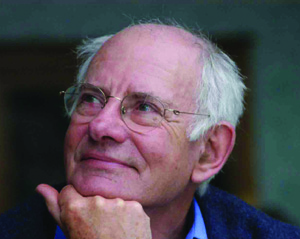 John Spurling is the author of the novels The Ragged End, After Zenda, A Book of Liszts and Ten Thousand Things, winner of the 2015 Walter Scott Prize for Historical Fiction. His plays have been performed on television, radio and stage, including at the National Theatre. He is a frequent reviewer and was for twelve years the art critic of the New Statesman. He lives in London and Arcadia, and is married to the biographer Hilary Spurling. Arcadian Nights is published by Duckworth Overlook. Read more.
John Spurling is the author of the novels The Ragged End, After Zenda, A Book of Liszts and Ten Thousand Things, winner of the 2015 Walter Scott Prize for Historical Fiction. His plays have been performed on television, radio and stage, including at the National Theatre. He is a frequent reviewer and was for twelve years the art critic of the New Statesman. He lives in London and Arcadia, and is married to the biographer Hilary Spurling. Arcadian Nights is published by Duckworth Overlook. Read more.
johnspurling.com
Author portrait © Nick Spurling

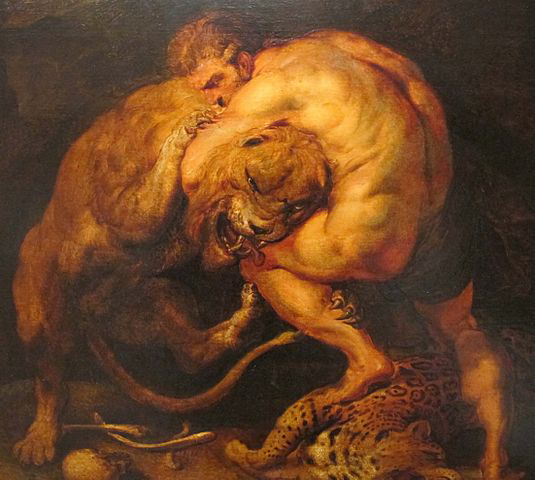 Herakles fighting the Nemean Lion by Peter Paul Rubens (1577–1640). Wikimedia Commons” width=”270″ height=”242″>
Herakles fighting the Nemean Lion by Peter Paul Rubens (1577–1640). Wikimedia Commons” width=”270″ height=”242″>